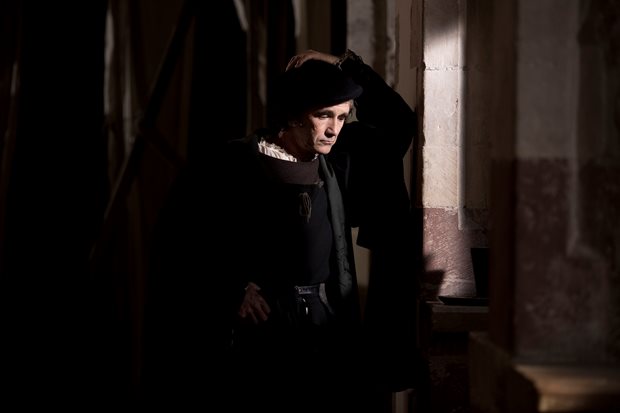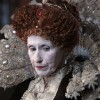Wolf Hall, BBC Two review: ‘no heart of darkness, just bad lighting’
Wolf Hall, Episode One, reviewed for The Spectator, 22 January 2015

It starts in darkness. And no, it’s not a metaphor for the crooked timber of the human heart, it’s just bad lighting. Stanley Kubrick sourced his cameras from NASA in order to capture candlelight in his eighteenth-century epic Barry Lyndon; director Peter Kosminsky’s techniques in Tudor drama Wolf Hall seem decidedly sublunary by comparison. And it’s not just the odd interior scene: twilight, candlelight, or moonlight, a nation of viewers tuned into learn about Henry VIII’s Great Matter and instead spent the opening credits frantically ascertaining how to adjust our TV dials.
But if all I’ve got to kvetch about is colour contrast, it’s because as a story, Wolf Hall’s opening episode last night was actually rather good. We’ve all seen endless courtroom dramas about the divorce of Henry VIII from Katherine of Aragon – I suspect more of us know about ‘papal dispensation’ than can explain the doctrine of infallibility – so Kosminksy’s adaptation assumes familiarity on the part of the viewer and doesn’t waste time on the basics. Rather, like Hilary Mantel’s original novel of the same title, this is a story about humanity, a gently domestic re-imaging of the interior life of Thomas Cromwell, who would rise from unremarkable origins to be one of Henry’s most powerful ministers. Henry, Katherine and Anne Boleyn drift in the background, occasionally bursting to the forefront in all their vivacity, but for most of this episode, they were notable for their absence. Damian Lewis’s Henry only made his appearance in the closing minutes.
Instead, we shadow Thomas (Mark Rylance), a man at the centre of the intellectual interchanges that would coax the Reformation to England. He meets in secret with reformists; he tries to cajole his wife into reading Tyndale’s illegal English-language Bible; he even encourages his precocious daughter to learn Greek. (Not unusual amongst his peers – I am currently researching the life and work of Jane Lumley, daughter of the Earl of Arundel and at about thirteen years old, the first person known to have translated Euripides into English.) Unlike the RSC’s recent stage production, Peter Straughan’s script keeps our focus on Cromwell the family man, in love with his wife, devastated by losing her and his daughters on the same day in an epidemic. It may not be true to history, but it is true to Hilary Mantel.
And if it was commonplace for men like Cromwell to hire expensive tutors for their daughters (the academic Diane Purkiss calls it the ultimate in conspicuously useless consumption, ‘like buying a banquet in order to throw it away uneaten’), Mantel and the BBC don’t want you to know that. Because here, Cromwell is our heroic outlier – ahead of his time, proto-feminist, skeptical, modern, unlike the evil, repressive More. In a paragraph that could have come straight out of Dostoevsky, Mantel’s Cromwell is tempted to ask Thomas More,
‘Why does everything you know, and everything you’ve learned, confirm you in what you believed before? Whereas in my case, what I grew up with, and what I thought I believed, is chipped away a little and a little, a fragment and then a piece more. With every month that passes, the corners are knocked off the certainties of this world.’
Anachronistic? Yes. Even the most strident of Cromwell’s German radicals only substituted their own new certainties for equivalent Papal orthodoxies. But nonetheless, a comfortingly familiar expression of twenty-first century doubt. And what Mantel takes a paragraph to say, here Mark Rylance expresses in a heavy-lined glance. This is a six-part TV encomium to the virtues of uncertainty.
So it’s a shame that we haven’t seen much of Thomas More himself in this opener. We make up for it with plenty of Bernard Hill’s deliciously neanderthal Duke of Norfolk, inbred dolt and infernal snob. His main object of derision is Jonathan Pryce’s Cardinal Wolsey (probably not, in fact, the son of a butcher, but it’s too good a myth for fiction to lose). And it’s the relationship between Cromwell and his political mentor Wolsey that anchors this first episode, thanks to an enthralling performance from Pryce. It’s a softer, more benign Wolsey than the historical record suggests – there’s good evidence that this man of iron ambition even lobbied hard to be Pope – but he’s not lacking in political wit. Wolf Hall is as much a drama about fatherhood as anything else, and not just Henry VIII’s: Cromwell rejects his abusive dad, seeks a new one in Wolsey, and in turn replaces his own dead daughters with young male protégés. It’ll be tough for the series to maintain this power when Pryce’s Wolsey exits the show. All eyes then, next week, on Damian Lewis…
Kate Maltby is completing a PhD on Elizabethan intellectual history, and is also a theatre critic for The Times. She will be live-blogging each episode in the current series of Wolf Hall at www.twitter.com/KateMaltby






